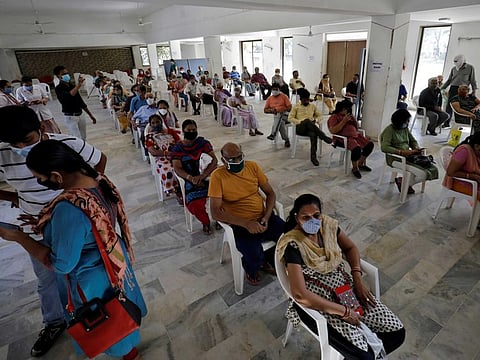COVID-19: India must act now to prevent a third wave
Daily record of 8 million a good start for new vaccination regime

India’s record of vaccinating more than eight million people in one day yesterday is a welcome milestone for a country that has managed to immunise only five per cent of its total population against Covid-19 so far.
That record comes amid signs that a devastating surge of coronavirus infections that ripped through the country a couple of months back and killed more than 180,000 people, is beginning to taper off. New cases continue to decline and states such as Telangana, Maharashtra and the capital New Delhi have announced a major easing of restrictions in place during the surge.
From the fish markets of Kolkata to the wedding halls of Hyderabad and the shopping malls of New Delhi, crowds seems to have returned to busy public places, enjoying every moment of their newfound freedom with wanton disregard to social distancing and wearing masks.
Misplaced sense of complacency
Coupled with the country’s low speed of vaccination and an alarming rate of vaccine hesitancy, this misplaced sense of complacency could put India’s fragile gains against COVID-19 at enormous risk – and only hasten the arrival of the so-called third wave that every epidemiologist is warning of.
According to Dr Randeep Guleria, chairman of India’s flagship All India Institute of Medical Sciences, the third wave has become inevitable with the resumption of social and commercial activities without proper preventive measures in place. Whether that wave hits the country in the next six weeks or twelve, it’s a catastrophe that India cannot afford and must do everything at its disposal to prevent it or significantly lower its impact.
According to a survey, nearly 96 per cent of companies across the country reported a high to moderate impact on their businesses due to state-level lockdowns at the height of the second wave. Thousands of businesses shuttered as demand evaporated once again.
Rerun of the scenario
To prevent a rerun of that scenario, vaccination rates must go up significantly to protect most Indians from the virus – and the new regime that began yesterday where every adult is eligible for a free shot is a great first step.
Simultaneously, individual states must also carefully evaluate what services and activities they need to reopen – and then do it in a calibrated manner.
The government must enforce proper precautions for public parks, shopping malls, restaurants and gyms which have been reopening across several cities – and there must be consequences for blatantly flouting the capacity rules.
It is this sensible and responsible public behaviour and vigilance from the administration that would go a long way in preventing super-spreader events and a corresponding surge in infections. Otherwise, the grim prospect of death and despair that gripped India in April and May will be soon at its doorstep once again.








